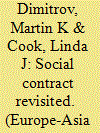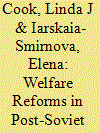| Srl | Item |
| 1 |
ID:
174201


|
|
|
|
|
| Summary/Abstract |
The COVID-19 pandemic has tested the preparedness of Russia’s public health system to respond to a nationwide crisis, and the ability of its broader welfare state to cushion the population against the economic impacts. This essay puts these developments in the context of recent reforms of the health care and welfare systems, showing how they affected the population’s vulnerability to the pandemic’s health and economic shocks, and the government’s ability to manage both.
|
|
|
|
|
|
|
|
|
|
|
|
|
|
|
|
| 2 |
ID:
151455


|
|
|
|
|
| Summary/Abstract |
The social contract thesis explained stability in communist autocracies as a consequence of an implicit exchange between the regime and the populace: citizens remained quiescent and the regime provided them with secure jobs, social services, subsidised housing, and consumer goods. Our essay asks how well the social contract thesis applies in three different types of regimes. We review classic literature on the socialist social contract in light of newly available archival evidence on the Soviet Union. We turn then to reform-era China and Putin’s Russia, finding that these post-socialist regimes create distinctive ‘market social contracts’. Our work shows that communist and authoritarian leaders cater to the consumption needs of populations in a strategic effort to remain in office and highlights the centrality of mass cooptation for explaining durable authoritarianism.
|
|
|
|
|
|
|
|
|
|
|
|
|
|
|
|
| 3 |
ID:
190462


|
|
|
|
|
| Summary/Abstract |
In recent years, the Russian government has adopted major social policy reforms that incorporate contemporary state-of-the-art international principles and practices. New legislation has mandated deinstitutionalisation, that is, closing Russia’s large network of residential facilities for children ‘without parental supervision’ (‘deti bez popecheniya roditelei’)Footnote1 and people with disabilities. Programmes of foster care and adoption are emptying orphanages, while efforts have been made to reorient efforts of social workers and family courts towards preserving families. Children with disabilities are being moved out of institutions and integrated into public schools, while adults now have possibilities to live and work in communities that have been made more accessible. ‘Active Ageing’ policies are designed to enhance the agency and self-determination of older people. Schools have begun to integrate the children of migrant workers. Some social service provision has been outsourced to socially-oriented non-governmental organisations (SONPOs; see Cook et al. Citation2021) in order to allow a choice of providers and services. While the progress of these reforms has been uneven, collectively they reflect the Russian government’s efforts towards integrating into mainstream society groups that have for decades been marginalised or institutionalised.
|
|
|
|
|
|
|
|
|
|
|
|
|
|
|
|